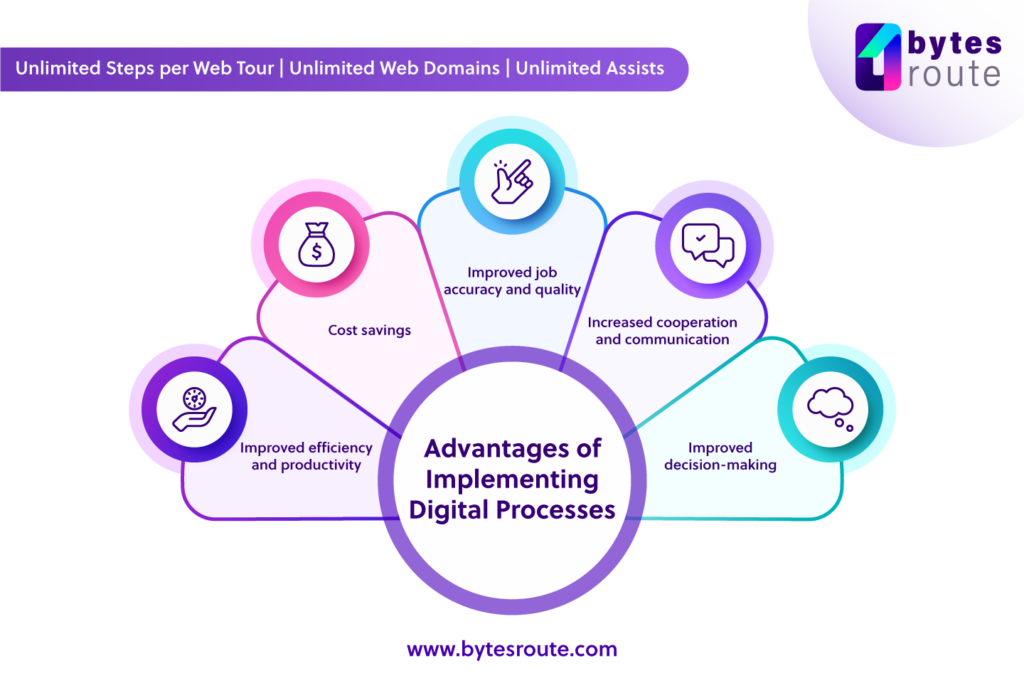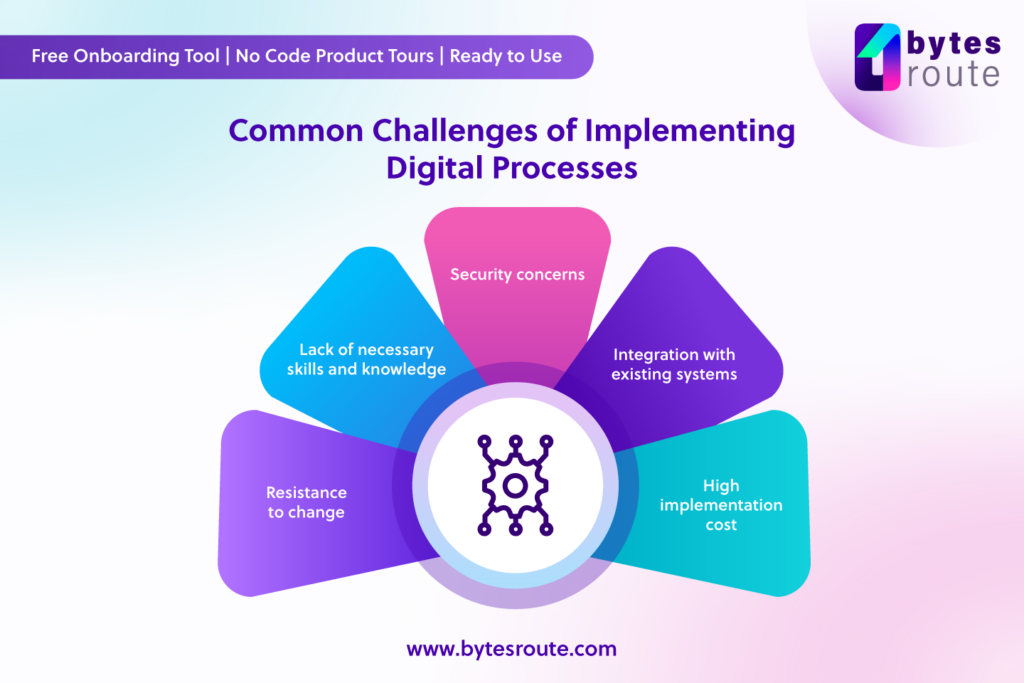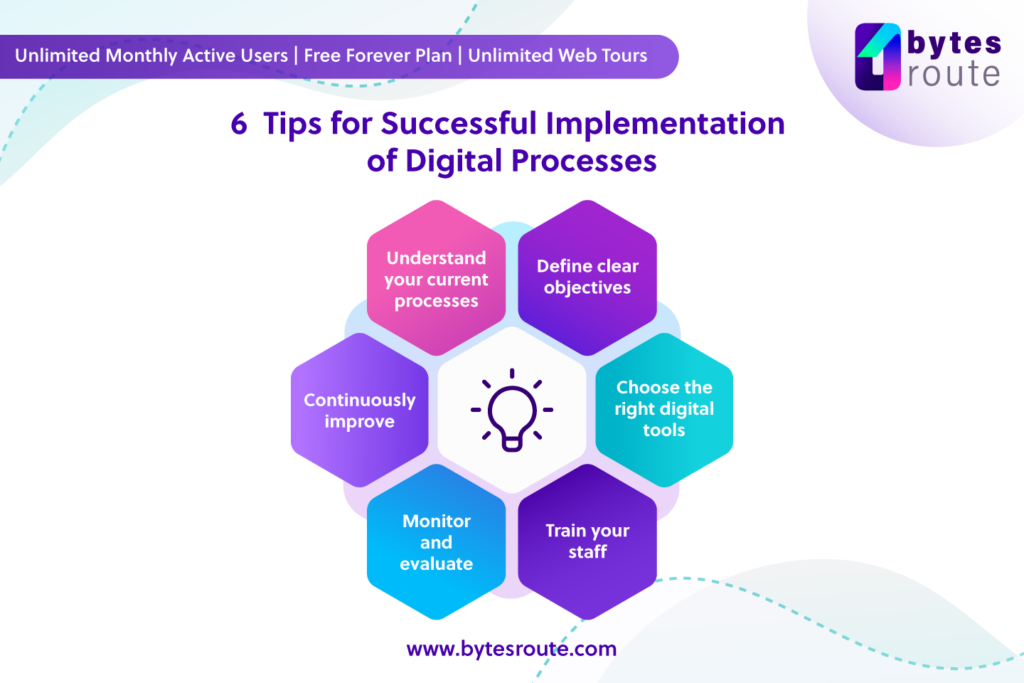What are digital processes?
Digital processes are the series of actions that use digital technologies and applications to automate specific operations and workflows. These are helpful in decreasing manual intervention and maximizing technology use.
Digital processes include a wide range of operations such as data gathering, processing, storage, and sharing. We encounter them in practically every aspect of modern businesses, from automating administrative tasks to delivering exceptional customer experiences and executing effective marketing strategies.
They are used in a variety of industries and applications, including manufacturing, finance, healthcare, education, entertainment, and many more.
The advantages of implementing digital processes

Digital processes have become necessary for different types of businesses, providing numerous advantages that assist them in remaining competitive in today’s fast-paced world. Following are some of the primary benefits of digital processes:
- Improved efficiency and productivity: Digital processes enable firms to save time and increase productivity by automating repetitive and time-consuming procedures. This allows them to concentrate on more important duties and achieve their objectives more efficiently.
- Cost savings: Because digital procedures reduce the need for human labor and paper-based documentation, firms can save significantly. This enables them to focus their resources on more strategic areas that promote growth and innovation.
- Improved job accuracy and quality: Digital processes lower the possibility of human error, resulting in more accurate and consistent output. This leads to higher-quality work that meets or exceeds customer expectations, increasing satisfaction and loyalty.
- Increased cooperation and communication: Regardless of location or time zone, digital procedures allow teams to cooperate more efficiently. This improves communication and collaboration, leading to greater results and speedier decision-making.
- Improved decision-making: Businesses benefit from real-time access to data and insights, allowing them to make more informed decisions. This enables them to respond to changing market conditions more swiftly and stay ahead of the competition.
In summary, digital processes are an important component of having a successful business, enabling it to operate more efficiently, deliver higher quality work, and respond more quickly to the needs of its customers.
The challenges of implementing digital processes

While digital processes offer many benefits, there are also several challenges that organizations may encounter when implementing them. Here are some of the main challenges:
- Resistance to change: People are often resistant to change, and digital processes can represent a significant change in the way that people work. This can lead to resistance, skepticism, and even fear of job loss, which can hinder the adoption and success of digital processes.
- Lack of necessary skills and knowledge: Digital processes require certain technical skills and knowledge, which some employees may not possess. This can result in a skills gap that needs to be addressed through training or hiring new employees with the necessary skills.
- Security concerns: Digital processes can introduce new security risks, such as data breaches or cyber-attacks. Organizations need to implement robust security measures to ensure that their digital processes are secure and protected against threats.
- Integration with existing systems: Digital processes need to be integrated with existing systems and workflows to be effective. This can be a complex process that requires careful planning and execution to avoid disruptions or compatibility issues.
- Implementation cost: Implementing digital processes can be expensive, requiring investment in new technology, software, and infrastructure. This can be a barrier to adoption for some organizations, especially smaller ones with limited budgets.
Overall, these challenges can pose significant obstacles to the successful implementation and adoption of digital processes. However, by proactively addressing these challenges, businesses can overcome them and leverage digital processes to gain a competitive edge in the rapidly evolving business landscape.
Best practices for implementing digital processes

Adopting digital processes can be a complex and difficult process, but following best practices can help firms succeed. Here are some recommended practices for implementing digital processes:
- Understand your current processes: Before implementing any digital process, it is important to have a thorough understanding of your current processes. Identify the bottlenecks and areas that require improvement, and determine how digital tools can help you address these issues.
- Define clear objectives: Clearly define the objectives of the digital process you are implementing. What are the outcomes you want to achieve? What are the benefits you hope to gain? This will help you measure the success of your implementation and ensure that you are on the right track.
- Choose the right digital tools: There are many digital tools and platforms available, but not all of them will be the right fit for your organization. Choose tools that are scalable, easy to use, and that can be integrated with your existing systems. Make sure the tools you choose are aligned with your organization’s goals and objectives.
- Train your staff: Your staff needs to be trained on how to use the new digital tools effectively. Develop training programs that cover the basics of the tools and how to use them for specific tasks. Provide ongoing training and support to ensure that your staff is using the tools to their full potential.
- Monitor and evaluate: Once you have implemented your digital processes, it is important to monitor and evaluate their effectiveness. Use metrics to measure the success of the implementation, and make adjustments as necessary.
- Continuously improve: Digital processes are not a one-time implementation, they need continuous improvement. Encourage feedback from your staff and customers, and use it to improve the process. Stay up-to-date with new digital technologies and tools, and be open to trying new approaches to improve your processes.
Essentially, implementing digital processes requires a dynamic approach that involves people, processes, and technology. By following these best practices, you can ensure a successful implementation that brings lasting benefits to your organization.